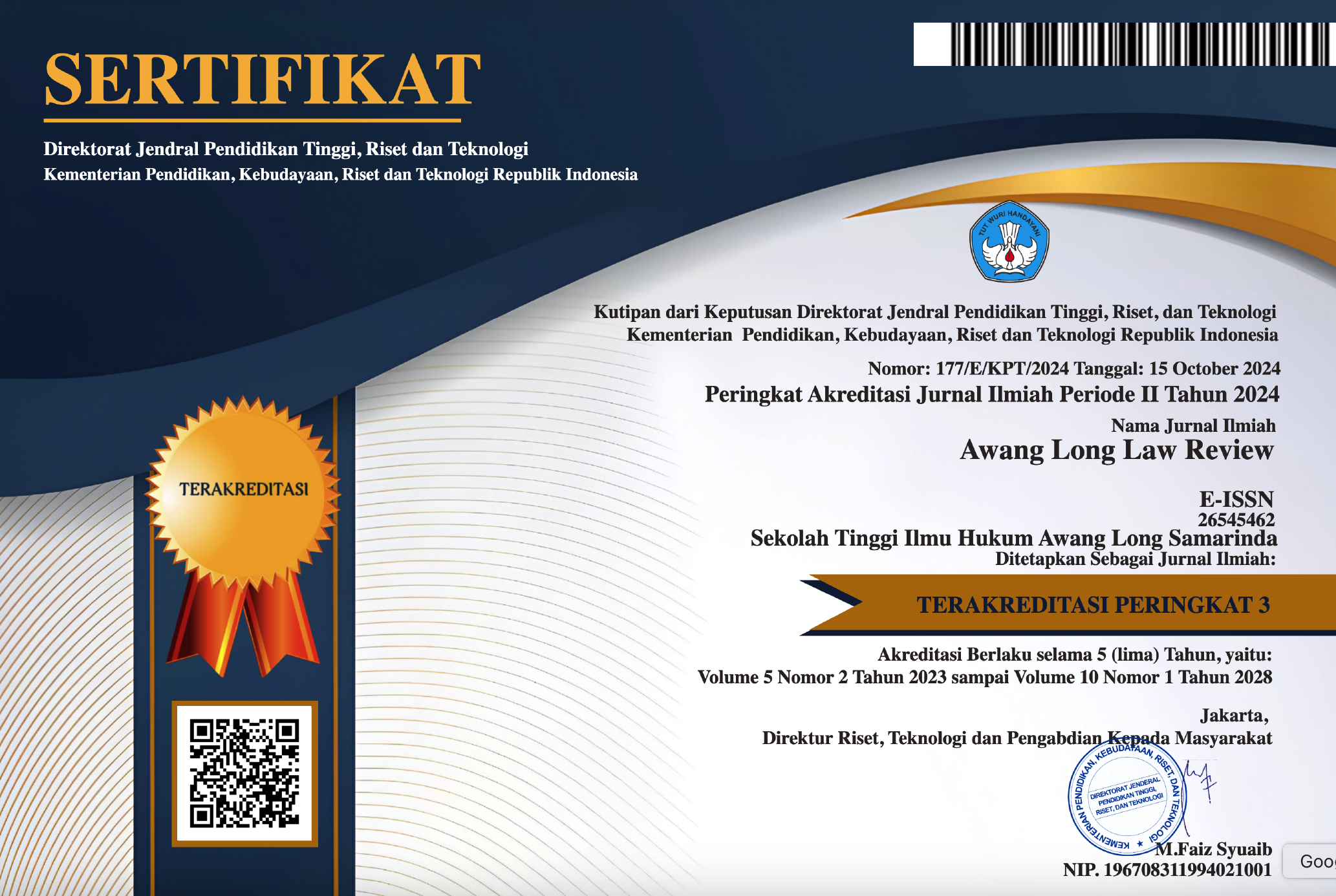CRIMINAL ACCOUNTABILITY FOR ILLEGAL ONLINE LOANS THAT CONDUCT CRIME IN THE FORM OF PEER-TO-PEER LENDING IN THE COMMUNITY
Abstract
There are many violations committed by illegal online lenders that are troubling the public, and are detrimental to the state because the state does not receive tax payments. The purpose of this study is to analyze and describe the accountability for criminal acts of illegal loan lenders who commit crimes in the form of Peer-to-peer lending to the community and to find out what precautions are being taken so that illegal lenders do not roam in Indonesia which results in the suffering of the Indonesian people. This research method uses a normative research type with the specifications of this research using normative juridical. Source of data in this study using secondary data. Data analysis in this study used descriptive qualitative method. The results of this study indicate that many perpetrators of illegal online loan providers commit violations of Indonesian government regulations, including Law Number 14 of 2008 on Public Information Disclosure Article 85 of the Population Administration Act, in addition to Article 17 letter (h), the Law Number 11 of 2008 Concerning Information and Information and Electronic Transactions Article 26 Paragraph (1) and (2), Article 51 paragraph (1) Jo Article 35 paragraph (1), Article 45 Paragraph (3), Article 45 B, KHUP (Kitab Criminal Law Act) in article 378 of the Criminal Code, Article 368 of the Criminal Code. So, the responsibility of the perpetrators of illegal online loan providers is to get sanctions for closing the company, imprisonment, as well as paying fines and providing compensation. Chairman of the OJK Board of Commissioners Wimboh Santoso said that his party had so far implemented various policies to eradicate illegal loans through the Investment Alert Task Force (SWI).
Downloads
References
Budiyanti. (2019). Upaya Mengatasi Layanan Pinjaman Online Ilegal. Info Singkat, 11(4).
Darmawan. (2021). Perlindungan Hukum Bagi Pengguna Pinjaman Online Terkait Bunga Pinjaman Dan Hak-Hak Pribadi Pengguna. Jurnal Hukum Kenotariatan, 6(2), 2502-7573.
Farid, A. Z. A. (1995). Hukum Pidana I. Jakarta: Sinar Grafika.
Kurnianingrum. (2021). Tindak Tegas Pinjaman Online (Pinjol) Ilegal. Pusat Penelitian Badan Keahlian Sekretariat Jenderal DPR RI.
Kurnianingrum. (2021). Tindak Tegas Pinjaman Online (Pinjol) Ilegal. Pusat Penelitian Badan Keahlian Sekretariat Jenderal DPR RI.
Kurniawan, C., Fajarianto, O., Sari, I. N., Wulandari, T. C., & Marlina, E. (2022). Assessing Learning Management System (LMS) for The Dairy Farmer: Obstacles to Delivering Online Learning Content. JTP-Jurnal Teknologi Pendidikan, 24(3), 341-352.
Marzuki, P. M. (2016). Penelitian Hukum. Jakarta: Prenada Media Group.
Moeljatno. (1983). Azaz-Azas Hukum Pidana. Bandung: Armico.
Nazir, M. (2003). Metode Penelitian. Jakarta: PT.Ghalia Indonesia.
Rochmani. (2017). Penanggulangan Terhadap Tindak Pidana Pencurian dengan Pemberatan (Curat) yang Dilakukan oleh Begal di Wilayah Hukum Polrestabes Semarang. Jurnal Dinamika Hukum Unisbank, 18(1).
Rochmani. (2020). Kebijakan Hukum Pidana Terhadap Pelaku Perundungan (Bullying) Anak Dibawah Umur. Jurnal Dinamika Hukum Stikubank, 21(2).
Soekanto, S. (1985). Penelitian Hukum Normatif, Suatu Tinjauan Singkat. Jakarta: Rajawali.
Soemitro, R. H. (1988). Metode Penelitian Hukum dan Jurimetri. Jakarta: Ghalia Indonesia.
Sofyan. (2016). Hukum Pidana. Makasar: Pustaka Pena Press.
Sudaryono. (2017). Dasar-Dasar Hukum Pidana Berdasarkan KUHP dan RUU KUHP. Surakarta: Muhammadiyah University Press.
Wahyuni. (2017). Dasar-Dasar Hukum Pidana di Indonesia. Tangerang: PT Nusantara Persada Utama.
Copyright (c) 2023 Iin Nurcahya Ningsih, Rochmani

This work is licensed under a Creative Commons Attribution-ShareAlike 4.0 International License.







